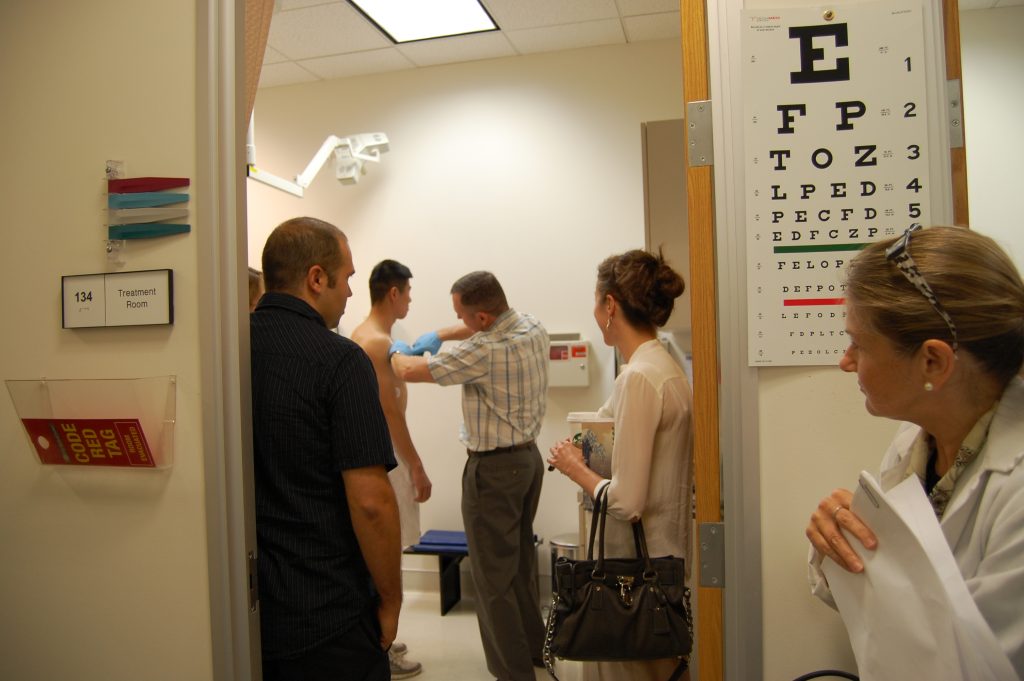Educational Programs at the COEH
We do things a bit differently, and that’s the way we like it!
Occupational Medicine Residency Program
The goal of the Occupational Medicine Residency Program is to prepare residents for the comprehensive practice of occupational medicine in a variety of settings, including private clinical practices, managed health care organizations, corporate medical departments, public health programs and legal or regulatory authorities.
The residency addresses the competencies specified by the Accreditation Council for Graduate Medical Education (ACGME) for residency training in preventive medicine-occupational medicine, as well as core competencies identified by the American College of Occupational and Environmental Medicine. A list of competencies addressed by the program is available for review. Graduates of the program are well prepared to take the ABPM certification examination in preventive medicine-occupational medicine.
Specific educational objectives include:
- Enabling residents to acquire knowledge of and the ability to apply the core sciences of preventive medicine—epidemiology, biostatistics, health care organization and administration, occupational and environmental health, and behavioral sciences—in the identification and solution of health problems in occupational groups
- Helping residents acquire knowledge and skills in toxicology, environmental monitoring and safety evaluation as they apply to individuals and groups
- Enhancing residents’ clinical knowledge in the care of people with occupational or environmental exposures and in the assessment of suitability for employment
- Teaching residents about planning, management and evaluation of occupational health programs in clinical practice and corporate settings
- Developing in residents an understanding of the policy-making process in occupational medicine with respect to law, regulation and workers’ compensation
- Creating in residents an understanding of the roles and expertise of other occupational health professionals, and to collaborate with these professionals
- Providing an opportunity for residents to develop independent research skills and to be able to use appropriate analytical techniques in the prevention of occupational diseases and injuries and in the evaluation of occupational health care programs.
These aims are achieved through the graduate degree programs during the academic phase, the field site training during the practicum phase, clinical training at UC Irvine’s Center for Occupational and Environmental Health (COEH), clinical case conferences, didactic seminars and the resident projects.
For more information, please visit
https://www.medicine.uci.edu/occupational/residency.asp
Environmental Health Sciences Graduate Program
The COEH provides training in Environmental Health Sciences, culminating with the award of the doctor of philosophy degree in one of two tracks, Environmental Toxicology and Exposure Sciences and Environmental Epidemiology, or the master of science degree.
The Environmental Health Sciences program provides students with the knowledge and skills necessary and appropriate to teach and/or conduct basic and applied research programs in inhalation/pulmonary toxicology, biochemical neurotoxicology, reproductive and developmental toxicology, exposure modeling, exposure assessment, chemical pathology, toxicokinetics, radiation toxicology, molecular carcinogenesis, environmental epidemiology, and risk assessment.
Environmental Toxicology involves the scientific study of the entry, distribution, biotransformation and mechanism of the action of chemical agents that are harmful to the body. The graduate program interprets environmental toxicology as the study of the effects and mechanisms of action of hazardous chemicals in food, air, water and soil in the home, the workplace and the community. It considers experimentally and theoretically such diverse research problems as:
- New scientific approaches to toxicological evaluation of environmental chemicals such as air and water pollutants, food additives, industrial wastes and agricultural adjuvants at the molecular, cellular and organism levels;
- Mechanisms of action in chemical toxicity;
- The molecular pathology of tissue injury in acute and chronic toxicity.
Exposure Sciences involves the study of human exposures to environmental contaminants in different media such as air, water, and food and via multiple routes including inhalation, ingestion, and dermal absorption. Environmental Epidemiology examines the effects of exposure to environmental pollutants and other factors on health outcomes. Research in the Exposure Sciences and Environmental Epidemiology Track includes:
- New approaches to the evaluation of human exposures to environmental chemicals, including exposure modeling and biomonitoring.
- Modeling individual level exposures to environmental pollutants and examining associations of these exposures with health and disease outcomes.
- Exposure to physical and psychosocial work environment hazards and health outcomes
For more information, please visit
https://www.medicine.uci.edu/occupational/graduate.asp
COEH Research Seminars
Since fall 2017, we have been holding monthly COEH Research Seminars during the academic year. Information on these events as well as our weekly EHS seminars may be found here. If you would like to be added to the list, please contact us at 949-824-8641.


